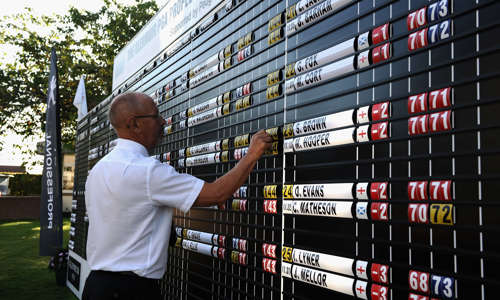The mental side of golf is not the exclusive preserve of a specialised professional. Rather, it’s a key component of a PGA Professional’s skillset, say Dave Collins, Steven Orr and Howie Carson in the final part of their series.
If you've not yet read part 1 and 2, click here.
In the two previous articles, we presented a five-stage performance pathway where we focussed on the nature of progressions and requisite skills that support young players to reach the professional tours (Stage 3) and beyond.
Notably, these stages covered an enormous period of development, not only physically but also psychologically and socially.
Reflecting this long-term agenda, we stressed the need to be proactive in developing the skills and attitude that enable players to both successfully take on and develop from such experiences. In short, the use of a nested approach to planning and preparation, with attention paid to current, next phase and longer-term needs.
Of course, these looked different and suggestively required a tailoring of coaches’ expertise for specific purposes, as the golfer’s needs changed and they matured.
Here, we will continue to advocate for a proactive, individualised and developmental approach, even once a player has made it on tour.
As such, we focus on several key demands and mental approaches needed to stay at the top and then transition again into Masters/Seniors competition. In short, ‘staying there’ skills as opposed to ‘getting there’ skills.
Similar as to when evaluating young golfers’ prospects, it should not be assumed that being able to achieve a certain performance standard (eg handicap) is the best indicator of future performance outcomes.
Despite being a grown adult in these latter stages, the need to address challenges and to cope successfully is no less important.
In fact, in these final stages the stakes are considerable and the consequences, whether positive or negative, are potentially life changing. For example, as reflected by the attrition rates on tour, that includes players with clear potential, as demonstrated by sparkling amateur careers.
Before exploring these final stages, we highlight again the need for individualised coaching, with progress and practices underpinned by the use of the Psychological Characteristics of Developing Excellence or PCDEs – see the box on page 20.
We now complete our ‘life cycle’ review of the top professional by considering the use of PCDEs and other coaching tools in the final stages of career.
The five lives of the high-level golfer
- 5–10 years: building the base
- 11–17 years: equipping for the journey
- 16–21 years: reaching the peak/getting on tour
- 21–35 years: staying at the top
- 45+ years: the move to seniors golf and living at the top
21–45 Years: Staying at the top
Despite many years of experience to groove, automatise and establish their technique, players at this stage still require small technical refinements in the form of tweaks or polishes and for diverse reasons (eg to avoid – or following – an injury, poor form, change to equipment regulations/course length).
Crucially, we suggest treading carefully if looking to make changes, since many good players have suffered from excessive twiddling – either in not being able to make the change or not being able to execute the change effectively when it counts.
Change clearly takes time to embed and be competition-ready; three to four months is typical but possibly longer depending on how complex the change is.
Notably, however, success in making a change that is long-term permanent – and pressure-proof – also involves a significant mental component. We recommend the Five-A Model of technical change that involves progressive stages of Analysis, Awareness, Adjustment, (Re) Automation and Assurance.
The Psychological Characteristics of Developing Excellence (PCDEs)
- Commitment
- Focus & distraction control
- Realistic performance evaluation
- Self-regulation
- Role clarity
- Planning & self-organisation
- Goal setting & self-reward
- Quality practice
- Effective imagery
- Seeking and using social support
Reflecting the PCDEs, players will need to have effective imagery skills in the Awareness stage when attempting to de-automate the existing technique and introduce an alternative movement solution.
To enhance this capability, we advise using contrast drills during practice whereby the player consciously compares the differences between the two versions – old and new, now incorrect and desired – with probing questions to help elicit and emphasise the associated feelings.
Undoubtedly when the skill is disrupted, golfers can feel dispirited, disorientated and frustrated. So, planning and organising the training regimen at an appropriate time of year, ensuring buy-in and commitment, and setting appropriate goals are all key to avoid unexpected regression.
Equally, drawing upon the mental side at the latter stages, players will need to employ focus and distraction control strategies to move from a very specific technical goal to one that is more holistic in nature.
This might be a focus on the swing’s rhythm as a means to retrieve all movement components from memory in a more balanced fashion.
As with all our advice, the need and the specific technique targeted for change must be individually assessed and ‘sold’ to the player if PCDEs are to be used positively and a constant state of change avoided – or even a flip-flop approach between coaches in search of a ‘magic answer’.
A further demand is the greater need for self-management. More travelling, being away from trusted support, less finance to protect this support and the need to make more independent decisions means that, to an even greater degree, players are on their own.
As an elite amateur, logistical factors such as travel, hotel bookings, entry into events and nutritional habits are often delegated to team officials and coaches whereas, in the professional arena, this responsibility can often fall to the player.
Also, in this stage there can be the need to personally raise sponsorship. While financial opportunities on the major tours are considerable, for a newly qualified professional the weekly outlay of £2,000 to £3,000 can be daunting without the aid of a sponsor. Therefore, players must be proactive and take responsibility for these small but important details that include media demands, where performance switches from golf to being respectable and marketable in front of the camera.
As a further contrast to elite amateur golf, players may be travelling for up to six consecutive weeks or more, often to different countries with different time zones, without a familiar support group.
To make headway (particularly in those crucial early years of the later stages), considerable self-reliance is critical.
Reflecting the PCDEs, planning and self-organisation will be important and extend to many areas, such as good time-management skills, managing playing schedules to facilitate recovery, time with coach (actual or, more commonly, virtual) to make any necessary changes in a planned and structured fashion and scheduling time to contact and meet potential sponsors.
Self-regulation will need to replace anyone telling them to practise, to go to the gym or when to go to sleep (unlike elite amateur golf). It is down to the player to demonstrate these good habits required to move their career forward.
High levels of self-regulation can reduce impulsive behaviours such as poor eating habits, alcohol consumption and poor practice habits, which may immediately satisfy but harm long-term prospects.
Equally demanding is the pressure to perform. This pressure varies in form and source, both external and internal. Externally, pressure can come from sponsors who have financially invested, club manufacturers who expect a return from the sponsorship deal they have offered the player and, indeed, the public.
With greater success comes greater visibility and greater judgement. This could mean playing in front of bigger crowds but also from online comments about their game, which are not always favourable. At home, there may be pressure to pay bills and support a family.
As previously mentioned, the cost of playing on a major tour can amount to over £100,000 per year just to break even.
Finally, professional golf comes with no job guarantee. Unless a player wins a tournament, which brings a two-three year exemption, players are essentially on a one-year rolling contract: if they do not earn enough to stay inside the top 120 on the money list, they lose their job.
Internally, players deal with these challenges differently, and while some can manage them with apparent ease, others will require training on how to do so. Thankfully, the PCDEs offer the coach this hand of cards to assist the player. Specifically, seeking and using social support will be especially important for the player.
Having a team around the player that they can trust in good and bad times can provide emotional, psychological and, of course, game-specific support.
We suggest that this psychological support can be taught by, with and through the coach and not just the sport psychologist
-
We suggest that this psychological support can be taught by, with and through the coach and not just the sport psychologist. Role clarity becomes an important PCDE as not all members of the team are important all the time. Sometimes the sport psychologist will do more if the player has issues that are performance psychology related. Other times it may be the coach, family member or caddie who is most important at that time. We believe having someone front and centre to orchestrate this approach is essential and that this again should fall under the coach’s role. Goal setting and self-reward will also be key PCDEs for the player to develop (through good coaching), where the ability to focus on both performance and process goals can help direct attention away from some of the aforementioned ‘outcomes’ and towards behaviours that are more within the player’s daily control.
45+ Years: The move to Masters/Seniors then living at the top
In this final stage, at around 45 years old, the player will be presented with new psychological challenges. There may be a recognition that their best years are behind them, but also the prospect of a new career on the horizon.
Earlier developed PCDEs will continue to be of great advantage in these later stages of their career. Firstly, the player may begin to realise their career is beginning to fade and, with that, the option/reality of an early retirement, either through choice or through losing their playing rights.
This can be difficult to deal with, so seeking and using social support will be critical, and having good people in your corner who offer an honest appraisal and ask you good questions are important – eg why do you play golf? What is your motivation to continue? What are you willing and not willing to sacrifice in this stage of your life?
These values-driven questions can be powerful in shaping the direction of a player’s later years. Realistic performance evaluation should enable the player to analyse their game objectively and in detail rather than emotionally, allowing them to focus in on critical areas to improve to both keep them on tour and to transition more easily to senior golf.
There will also be the challenge of competing with the rising young (er) guns. A strong and robust mental approach can be of enormous help here.
Specifically, coaches can utilise commitment levels and goal setting to see a path forward. As a coach, demonstrating belief in the player can be a source of confidence but, critically, the coach must be a key cog in driving their commitment levels.
Commitment towards equipment setup, strength and conditioning, nutrition and speed training don’t just help a player prolong their career but may also further enhance their golf. Also, an informed coach with an understanding of goal setting can help the player manage these seemingly big goals to maintain a tour card or prepare for senior tour competition, which can provide a big source of motivation and confidence for the player.
Entering a Seniors/Masters Tour can be seen as a second chance for success. Indeed, many players achieve major victories and career highlights in their more mature years.
Crucially, being able to adapt to new playing demands may require a review and change to a player’s practice priorities. For example, the premium on driving distance is much reduced when compared to the main tours, with a greater demand on wedge play and short game skills acting to open up the field.
So, quality practice becomes important to ensure that skills are Dave Collins Institute for Sport, Phys Ed and Health Sciences, University of Edinburgh. Grey Matters Performance Ltd. Stratford upon Avon. Department of Health and Human Performance, Dublin City University. 24 PGA Monthly | Issue 37 appropriate for the types of challenges and performance expectations. Despite the potential opportunities, players also need to consider the many lifestyle changes that occur at this moment in life, be they health and/or family related
Even though a player might execute well, for some, the travel and/or physical demands can quickly catch up with them, or wider family commitments may be more highly valued at this specific time.
Even though a player might execute well, for some, the travel and/or physical demands can quickly catch up with them, or wider family commitments may be more highly valued at this specific time.
Accordingly, planning and organising again becomes an important PCDE in being able to balance these different commitments. Finally, it is not uncommon for senior players to take on numerous roles within the golf industry, beyond playing. This might be as a representative, ambassador, broadcaster, head of foundation or captain, in what is often driven by a desire to give back to a community or industry.
Role clarity in this regard is the last PCDE we identify in highlighting the expanded role of the player in their final years as a professional.
Reflecting our coaching approach that values knowing not only how to coach but also being informed by what and why to coach in such a way, requires that expert coaches possess both deep and broad knowledge bases.
-
Implications for PGA Professionals
There are several general implications for the coach when working with golfers at these stages. Reflecting our coaching approach, that values knowing not only how to coach but also being informed by what and why to coach in such a way, requires that expert coaches possess both deep and broad knowledge bases. Particularly across these final stages, it is important that coaches view the nature of a player’s career, their way of life and the challenges faced as distinct.
Accordingly, the extent to which the coach is able to empathise with the player’s needs based on age and stage is a key factor in to working effectively. Returning back to our earlier idea that development is physical, psychological and social, identifying and understanding the balance and interaction of these requires an ability to manage any preconceived ideas and to be perceptive enough to this different mix of factors during the decision-making process.
Our suggestion is that a broad and deep knowledge base helps in identifying, exploring and evaluating different options available as a coach. In short, players at this stage need to be coached as individuals, beyond an appreciation of their superior ball-hitting abilities, with a clear motivation to understand and embrace psychological aspects as coaching tools.
So, in accepting such an individualised approach, coaches may need to adjust to a new way of looking at their role.
It is not uncommon for coaches also to work with players at different stages of development and in a club context. Therefore, expectation and role clarity becomes more of a priority when it comes to getting the most out of a player-coach relationship.
Establishing the ways of working early on is important to both in knowing what progress will look like and how support will be offered in a more self-reliant professional world.
In summary
Our three articles have focussed on the psychological demands and practices for players across the golf performance pathway. Specifically, we have emphasised the need for PCDEs in preparing players to negotiate the inevitable challenges along the journey. Given the complexity and individualisation required, our final suggestion is to consider whether these PCDEs might also help coaches in their pathway towards expertise.
We hope you have found our articles interesting and useful for your practice so far. We certainly endorse the use of mental skills by coaches with their players and hope to see you at our upcoming CPD course(s) where we will discuss and develop these ideas. Keep your eyes peeled for announcements from The PGA.
If you missed Parts 1 and 2, click here.
Dave Collins
- Institute for Sport, Phys Ed and Health Sciences, University of Edinburgh
- Grey Matters Performance Ltd. Stratford upon Avon
- Department of Health and Human Performance, Dublin City University
Steven Orr
- PGA Master Professional
- Professional Doctorate in Elite Performance
- Has his own golf Academy in West Sussex
- England Boys National Coach
- Interests include elite player development, coach development and skill acquisition
Howie Carson
- Senior Lecturer in Motor Learning and Control at The University of Edinburgh
- Fellow of The PGA
- BASES Accredited Sport & Exercise Scientist
- His interests address various aspects of skill, player and coach development




































